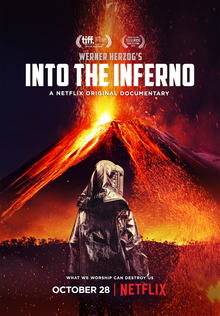| Into the Inferno | |
|---|---|
 Film poster | |
| Directed by | Werner Herzog |
| Written by | Werner Herzog |
| Based on | Eruptions that Shook the World by Clive Oppenheimer |
| Produced by | André Singer Lucki Stipetić |
| Starring | Clive Oppenheimer |
| Narrated by | Werner Herzog |
| Cinematography | Peter Zeitlinger |
| Edited by | Joe Bini |
Production companies | Spring Films Werner Herzog Film |
| Distributed by | Netflix |
Release dates |
|
Running time | 104 minutes |
| Countries | United Kingdom Germany |
| Language | English |
Into the Inferno is a 2016 documentary film directed by Werner Herzog. In it, Herzog and volcanologist Clive Oppenheimer explore active volcanoes around the world, especially how they have affected the cultures of the people who live near them. The film had its world premiere at the 43rd Telluride Film Festival on 3 September 2016 before it began streaming on Netflix on 28 October.